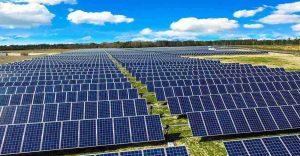Solar Modules The Building Blocks of Solar Power

Solar Modules The Building Blocks of Solar Power
Solar modules, also known as solar panels, are the fundamental units of a solar power system. These devices are designed to convert sunlight directly into electricity, harnessing the sun’s energy to power homes, businesses, and communities.
How Solar Modules Work
A solar module is composed of multiple photovoltaic (PV) cells, which are typically made of silicon. When sunlight strikes a PV cell, it excites electrons in the semiconductor material, generating an electric current. This direct current (DC) electricity is then collected and converted into alternating current (AC) electricity, which can be used to power various electrical appliances.
Types of Solar Modules
- Crystalline Silicon Solar Modules:
- Monocrystalline Silicon: These modules are highly efficient but also more expensive. They are characterized by a single, uniform crystal structure.
- Polycrystalline Silicon: These modules are less efficient than monocrystalline modules but are more affordable. They are composed of multiple crystalline structures.
- Thin-Film Solar Modules:
- These modules are thinner and more flexible than crystalline silicon modules, making them suitable for various applications, including building-integrated photovoltaics (BIPV).
Key Factors to Consider When Choosing Solar Modules
- Efficiency: The efficiency of a solar module determines how much of the sunlight it can convert into electricity. Higher efficiency modules generally produce more power.
- Durability: Solar modules should be durable enough to withstand harsh weather conditions, such as extreme heat, cold, wind, and hail.
- Warranty: A good warranty can provide peace of mind and protect your investment.
- Cost: The cost of solar modules varies depending on the type, brand, and efficiency.
Benefits of Solar Modules
- Clean and Renewable Energy: Solar energy is a clean and renewable energy source that produces no greenhouse gas emissions.
- Reduced Electricity Bills: Solar modules can significantly reduce or even eliminate your electricity bills.
- Increased Property Value: Installing solar modules can increase the value of your property.
- Energy Independence: Solar energy empowers individuals and communities to become more energy independent.
Challenges and Considerations
- Initial Cost: While the long-term savings can be substantial, the initial cost of installing a solar panel system can be significant.
- Weather Dependence: Solar energy generation is dependent on sunlight, so cloudy or rainy weather can reduce energy output.
- Space Requirements: Solar modules require adequate space for installation.
- Grid Connection: In many cases, solar panel systems are connected to the electric grid, which may require additional costs and permits.
The Future of Solar Modules
As technology continues to advance, solar modules are becoming increasingly efficient and affordable. With ongoing research and development, we can expect to see further innovations in solar cell technology, making solar power even more accessible and reliable. By embracing solar energy, we can contribute to a cleaner, greener future and reduce our reliance on fossil fuels.
Would you like to learn more about specific aspects of solar modules, such as installation techniques, maintenance tips, or government incentives for solar energy?




